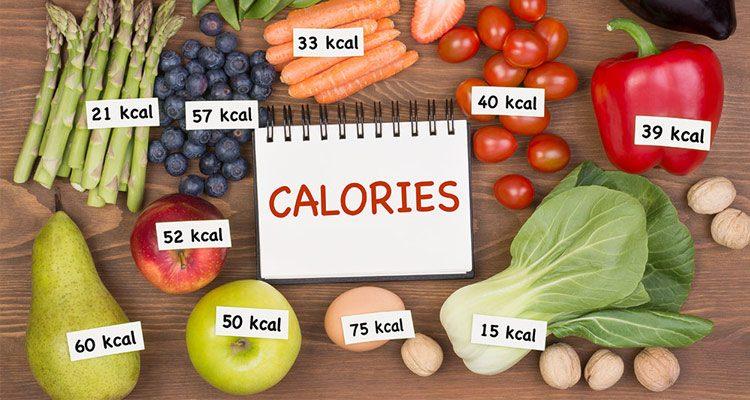How to Count Your Calorie Intake
Posted by Just Fitter on
When some people hear the word “calorie”, it is often associated this with weight gain or weight loss. But do you really know and understand what calorie is?
Understanding exactly what a calorie is, and why we count them, can help you make better dietary decisions!
CALORIE DEFINED
Calorie is a unit of measurement specifically defined as the amount of heat needed to raise the temperature of one gram of water by one degree Celsius. However, when "calorie" is used in reference to food, people are usually talking about the amount of kilocalories (kcal) a specific item has, which is what is listed on nutrition labels. One large kilocalorie is the equivalent of 1,000 small calories.
Foods we eat supply our bodies with calories, providing the energy we need to live and stay healthy. Everything we do relies on the energy that comes in the form of calories, whether it is sitting on the couch for hours at a time or running a marathon. This means, we need to eat certain amounts of calories just to sustain life. But if we take in too many calories, then we also risk gaining weight.
Part of the confusion with calories comes in because calorie count alone does not determine whether a food is nutritious or not. It is more about the type of calorie we take in, such as if it supplies vitamins, minerals, and fiber or if it is void of nutrition and more of an "empty calorie." To make matters even more confusing is that all calories are not the same. For instance, you can consume about 150 calories by eating a candy bar, or by eating 30 cups of lettuce.
COUNTING CALORIES
Keeping track of your calorie intake helps you better understand the amount of calories your body needs to lose, gain, or maintain a certain weight. Whatever your goal is, knowing how many calories you are eating is key to achieving your desired effect. And one way to monitor your calories is keeping a food diary with you and jotting down everything you eat, from the almond nuts you pass by on the counter, the complimentary drinks offered by the hotel staff, or the delectable macaroons from your grandmother–literally everything. If you want to lose weight and burn some of that body fat, you might want to diligently watch your diet.
KETOSIS AND KETO DIET
Carbohydrates also known as carbs are the main source of energy for the body. They are the sugars, starches, and dietary fiber that occur in plant foods and dairy products. On the other hand, keto is a very low carb, high fat and moderate-protein diet. This ketogenic diet is a popular, effective way for weight loss and improve your health. However, in keto, your body doesn't have enough carbohydrates to burn for energy, instead, it burns fat and produces ketones which it can use for fuel or as an alternative source of energy to sugar. This process is called ketosis. So how do you know that your diet has already brought your metabolic state into ketosis? Let’s test!
TESTING KETOSIS
There are three main ways to test for ketones: urine, blood and breath. But these two types of keto strips are the most common: urine and blood. Urine strips are ideal if you're new to the keto diet and want an easy and affordable way to ensure you're headed towards ketosis. Once your body has become keto-adapted, ketone test strips or ketone blood meters are a reliable and accurate way-but also more expensive-to measure the ketones in your body.
Both of these ketosis strips measure something different from one another, blood tests measure β-hydroxybutyrate levels, and urine tests measure acetoacetate levels. β-hydroxybutyrate and acetoacetate are ketones produced during fat metabolism. If you are burning fat, you are making ketones, so both can be a gauge of ketosis.
HOW TO READ KETOSIS STRIPS

Suggested reading for urine ketone strip is approximately 15-40 seconds after dipping it in urine for 1-2 seconds. This kind of keto strip follows the “dip and wait for 15-40 seconds” method. In each case, always follow package instructions.
After waiting for a few seconds, you will start to see the color in the strip change, so place the strip side by side its color chart. The more purple it becomes, the greater the presence of ketones in the body.

Ketone Blood Meter Chart
Unlike the urine strips, the ketone blood strips make use of a digital meter wherein the strip is placed, and blood is drawn from your finger using a lancet. Instead of comparing the result to a color chart, a range of numbers determines your body’s ketosis.
LOOKING OUT FOR SOME SIGNS AND SYMPTOMS
- Bad breath
- Weigh loss
- Appetite suppression
- Increased focus and energy
- Short-term fatigue
- Short-term decreases in performance
- Digestive Issues
- Insomnia
HEALTH CHECK AND SELF CARE
It is always ideal to keep ourselves healthy. In order to do that, you can start by assessing the condition of your mind and body. A routine health check will help reveal what your body needs; perhaps some exercise or changes in your diet. Apart from that, self-care monitoring is also essential. This will be your way to start practicing good health management without the aid of your medical professional. Your self-care will also help you determine your individual control, deliberate and self-initiated practices for your total health and well-being.
THE BOTTOM LINE:
CALORIES AND KETOSIS. Calories are both good and bad. We need it to keep going and keep functioning, but too much of it isn’t good either. So we think of Ketosis. Ketosis is this natural metabolic state that can be achieved by following a ketogenic diet, where we use fats instead of carbs as our main energy source. However, following a strict diet to induce ketosis can be very difficult, but finding out if you are in ketosis is pretty easy with the help of keto strips. The urine ketone strip is an easy, cheap and convenient way to measure ketosis. All you have to do is follow the directions from your kit for the most accurate results.
Moreover, ketosis is not for everyone, as it also has its negative effects, but it can be beneficial to some people too. So knowing what you want to achieve for your health is important. If you read all about keto and ketogenic diet and you wanna give it a try, go ahead! Just always make sure you’ve checked in with your health. HAVE YOU COUNTED YOUR CALORIES TODAY? AND WILL YOU EMBARK ON A CALORIE-COUNTING-KETOGENIC-DIET?
References
- https://www.verywellfit.com/what-is-a-calorie-and-why-should-i-care-3496238#how-to-count-calories
- https://www.webmd.com/diabetes/type-1-diabetes-guide/what-is-ketosis#1
- https://www.medicalnewstoday.com/articles/161547#what-are-they
- https://www.healthline.com/nutrition/keto-strips
- https://www.healthline.com/nutrition/10-signs-and-symptoms-of-ketosis#_noHeaderPrefixedContent









